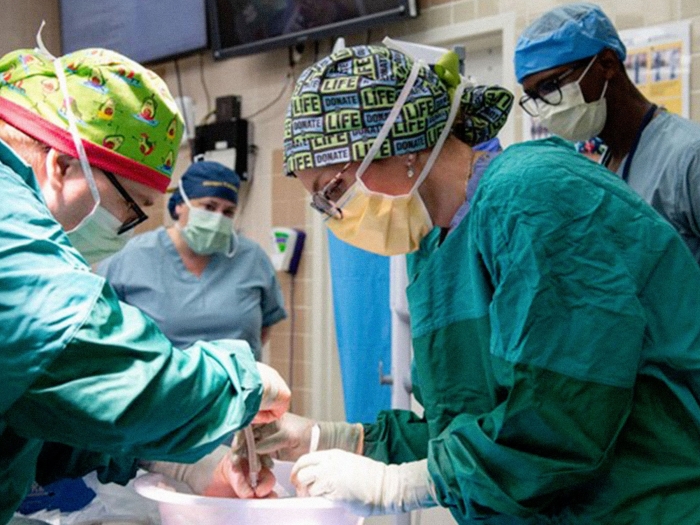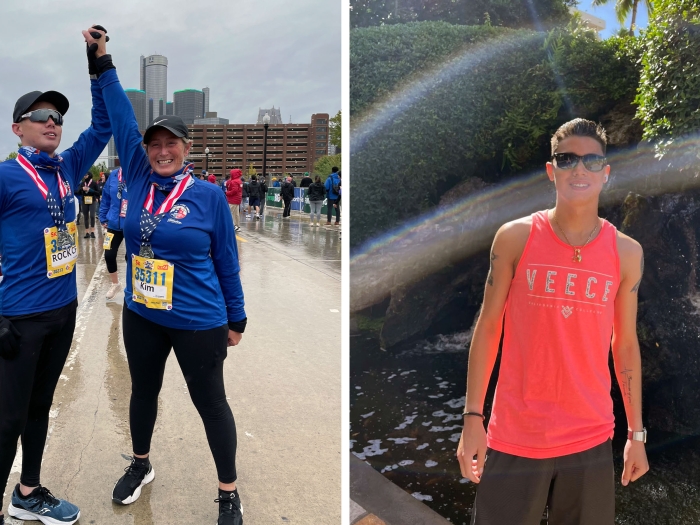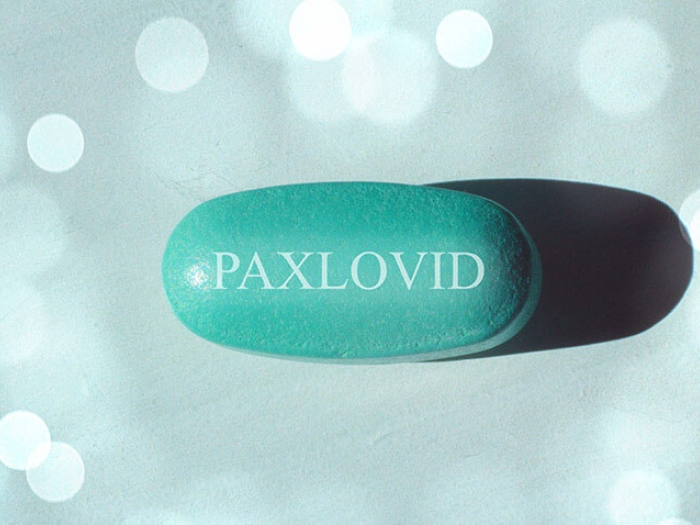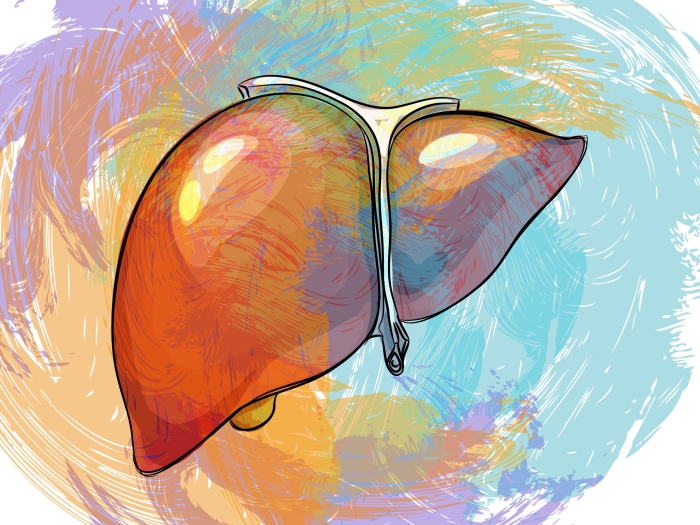After a lifetime of struggle, Edwen Lopez faced his biggest challenge: receiving a liver transplant. A Michigan Medicine transplant team was ready to help him win.
7:00 AM
Author |

Feeling well still feels like a novelty to Edwen R. Lopez Sr.
One year after receiving a liver transplant at the University of Michigan, the 60-year-old says he feels "epic, fluid — solid as granite."
MORE FROM MICHIGAN: Sign up for our weekly newsletter
Those emotions resonate during weekly hikes in the San Diego County mountains with his young grandson, Caius. Although he can't run, the result of a 2009 back injury, Lopez relishes the chance to be active again like he was as a soccer player in his youth.
The Chula Vista, California, resident looks better, too. He shed his nickname, Butter — a term that his son, Blake, coined after his father's skin had turned leathery yellow.
The reason: Lopez was diagnosed with stage 4 nonalcoholic steatohepatitis cirrhosis, better known as NASH disease, in 2015.
NASH is characterized by accumulation of fat in the liver, along with inflammation and scarring of the liver, followed by cirrhosis, liver failure and cancer.
Lopez faced all of those issues. When Michigan Medicine surgeon Christopher Sonnenday, M.D., MHS, removed Lopez's liver during the transplantation, the organ was black.
"I don't drink alcohol, so it was from eating too much good Mexican food," says Lopez, a father of four, who jokes his way through every tough situation.
At 6 feet tall, Lopez weighed 260 pounds when he was diagnosed. He dropped 100 pounds before surgery without trying, the result of feeling awful and going in and out of hospitals, eventually every other day, to drain fluids accumulating in his body because of his dying liver.
Lopez felt so ugly, he forbade extended family to visit because of the drastic change in his appearance. Luckily, his old soccer teammates disregarded the rules and surprised him with a visit, rekindling some long-lost friendships that had dissolved because of life's busy speed.

Joining a new team
Lopez credits his son for saving his life.
The family patriarch moved from California to Ann Arbor, Michigan, to get treatment at the University of Michigan Transplant Center at the urging of Blake, a medical student who graduates from Michigan State University this May.
SEE ALSO: How Does Living Liver Donation Work? 6 Things to Know
The transplant center embraced the elder Lopez, introducing him to a new team of doctors, nurses, students and professors with the same goal: help him live to be around for his family.
Lopez made it on the transplant list on March 23, 2017, a process that would have been harder in California, where five states compete for the same available livers. Michigan, however, is in a region where only three states vie for a liver. The regions are decided by the Organ Procurement and Transplantation Network.
"These people were my team of angels," Lopez says. "They were the kindest, most beautiful people that I have ever met. Not a day goes by when I don't reflect back on last year in Michigan.
"I would not be standing here today if my son, Blake, hadn't convinced me to go to Michigan."
A life-changing smile
Lopez cries at the memory of the biggest smile he had ever seen, which transpired just one day after making it on the organ waiting list. A doctor, whose name escapes Lopez, entered his hospital room with a generous smile to ask a question: "Are you ready?"
Hoping it meant what he thought, Lopez began to celebrate with his sister, Arleen Drew, who left her ailing husband in California to be at Lopez's side during his Michigan stay. The doctor followed it with the words the family had been praying for: "We got one."
To receive a transplant liver, the donor's body size and blood type must match the recipient.
"Basically, it's a miracle whenever one is just the right match," says Lopez, who remembers spending the next 12 hours receiving congratulatory hugs from the Michigan Medicine hospital staff, especially all the nurses on his floor.
"They didn't have to do it, but they did — and it's a memory I cherish."
Finding strength and gratitude
The night before the transplant, Lopez found himself reflecting on how he got to this point of his life. It's a natural reaction; the staff warned him repeatedly that he may not survive the surgery.
SEE ALSO: A 'Miracle' Transplant After Acute Liver Failure
Lopez had never been more terrified. And that's saying something.
He grew up with an abusive father. He saw his dreams nearly die when he broke his leg two weeks before graduating from high school, an injury that required four surgeries and cost him a college soccer scholarship. He became a prison guard, witnessing countless acts of violence and death.
And Lopez endured pain for an entire year after the discs in his back broke and surgery failed, causing him to survive on disability. He lost his house, his furniture, his ability to run, and, after filing for disability, his financial footing.
"Everything was for a reason," he says. "It was to make me stronger for this moment."
Before the transplant surgery on March 26, 2017, Lopez found himself praying at 3 a.m., which dissipated his fears. He was ready. And he fell asleep until just before surgery time, when he thought again about where he was in life.
"I noticed how black and blue my body was; it was the realization that I was so close to death because my body wasn't working anymore," Lopez says.
'A second chance at life'
As he was wheeled down the hall on a gurney, Lopez stared up at the white ceiling lights and conjured up images of heaven.
"I knew it was either the end or a rebirth, a second chance at life," he says.
Knowing the outcome he wanted, Lopez fired himself up like the athlete he fancies himself to be. He greeted the dozens of people waiting for him in the surgical suite.
A team was there to take the dying liver out, and a transplant team was there to give him a new one.
A lifelong believer in teamwork on and off the playing field, Lopez immediately felt comfortable.
"I told them after we should have lunch," he says, drawing laughter from the doctors and nurses.
A liver transplant typically takes eight hours but sometimes can take as long as 12 hours. Lopez's was completed in three.
Sonnenday, who is surgical director of the Adult Liver Transplantation Program at Michigan Medicine, recalls everything going to plan.
"When we put in the new liver we wait to see that it's working well, and his started working quickly," Sonnenday says. "Often, you have to wait for that."
Newfound energy after transplant
When Lopez woke up, the experience felt like less than 10 seconds had passed. He asked the nurse, "What's up? When will the surgery begin?" The nurse laughed, explaining that the transplant was complete.
SEE ALSO: Strength in Numbers: Why Organ Donation Matters [Infographic]
"It went in perfectly, and I heard that it was the doctor's quickest, easiest surgery in his transplant history," Lopez says.
And then he felt it. The dressing was hiding what Robert Fontana, M.D., his hepatologist, calls Lopez's "Mercedes hood." His U-shaped scar resembles the luxury car's hood shape.
"I felt good immediately," Lopez says. "I could tell my liver was working."
The patient felt so well that he got off the gurney himself to move to a hospital bed. And then he asked to take a walk. After much resistance, Lopez and a nurse shuffled through the halls, where staffers stopped to offer hugs and high-fives.
It was his victory lap.
Today, Lopez is continuing that victory lap. He was released from the hospital within 10 days and never returned for any hiccups. He now weighs 225 pounds and recently achieved his goal: moving back to California to be with his home team.

Explore a variety of health care news & stories by visiting the Health Lab home page for more articles.

Department of Communication at Michigan Medicine
Want top health & research news weekly? Sign up for Health Lab’s newsletters today!





